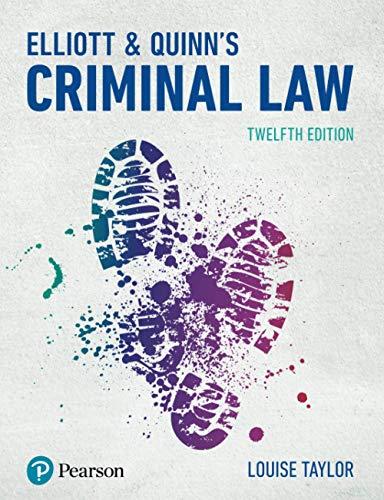Question
What is the main point of the paragraph? Explain why it is important. What is the central Concept? Explain the purpose. According to Using the
What is the main point of the paragraph? Explain why it is important. What is the central Concept? Explain the purpose.
According to Using the Master's Tools: Reflections on Feminist Lawyering and Process, the author discussed feminism sees gender-based hierarchy as the basis of widespread and sustained systemic inequality for women; some feminists, myself included, see the fight against patriarchy as an encompassing struggle against racism, heteronormativity, and colonialism. I use the term "professionalism" here to refer to the legal profession's performativity and patterns of communication, which derive from its closed organization and reproduction and from its white, class-privileged male character. I assume that there are law students and legal practitioners who are animated by feminist beliefs, given, for example, the resurgence of women in the profession identifying as "feminist" with pride. I argue that such a lawyer should necessarily be alive to the ways that power is exerted by the legal system over her clients and, particularly, by her own complicity in those exercises of power. I similarly argue that, if unchecked, the feminist lawyer's expertise can unduly shape her approach to her clients' claims. I query what relationship exists-whether uneasy or unacknowledged-between a practitioner's feminism and her professional identity; can she employ a shifting analysis of power that includes herself as exerting influence over clients? I begin with a preliminary discussion on the theoretical foundation of the feminist lawyer and our professional identity and, subsequently, raise questions about possible methodologies that a lawyer could employ to give effect to feminist principles within her client relationships. I do so in conversation with former clients, choosing to privilege their experiences as valuable sources of knowledge. Building on the theoretical work of Naomi Cahn and Lori Beaman-Hall, I inquire into behaviors that take place behind lawyers' office doors-behaviors that they characterize as discursive practices that demand greater attention. I argue that feminist lawyers' responsibilities must encompass the voice, the emotion, and the desired outcomes of their clients. Paradoxically, paying greater attention to our clients depends on our own ability to critically reflect on professionalism, race, and power.
Step by Step Solution
There are 3 Steps involved in it
Step: 1

Get Instant Access to Expert-Tailored Solutions
See step-by-step solutions with expert insights and AI powered tools for academic success
Step: 2

Step: 3

Ace Your Homework with AI
Get the answers you need in no time with our AI-driven, step-by-step assistance
Get Started


